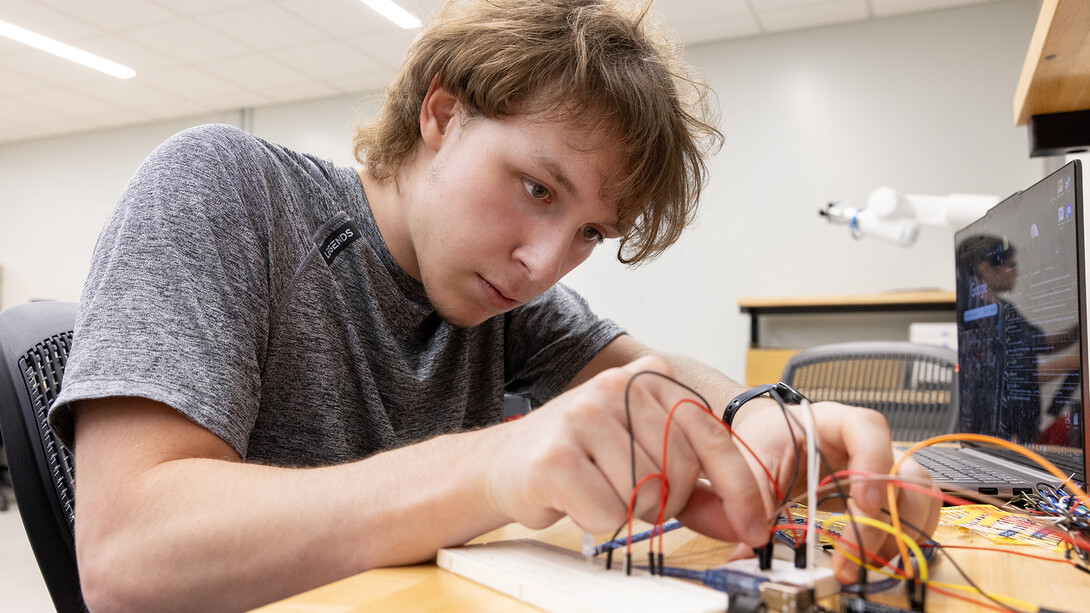
The University of Nebraska–Lincoln has launched a robotics engineering undergraduate major, the first of its kind in the state and a milestone in the university’s long-term investment in interdisciplinary, hands-on engineering education.
"This program positions Nebraska at the forefront of robotics education in the Midwest," said Lance C. Pérez, dean of the College of Engineering. "It is our latest initiative to ensure that we, as the state's only College of Engineering, are educating the workforce of the future for Nebraska. And, the robotics major will help continue our record-setting undergraduate enrollment growth."
The new Bachelor of Science in Robotics Engineering began enrolling students this fall and builds on more than 15 years of robotics instruction at Nebraska, along with three years of focused curriculum development supported by a federal, $25 million Heartland Robotics Cluster grant.
It unifies faculty and coursework from mechanical engineering, electrical engineering, computing and agricultural systems, offering a cutting-edge curriculum designed to prepare students for a rapidly evolving robotics industry.
“This is the culmination of years of work,” said Carl Nelson, associate dean of engineering, professor of mechanical and materials engineering and a leader in the program’s development. “We’ve had strong robotics efforts scattered across departments. This major brings them together into a unified pipeline — one that not only serves students, but supports economic growth across Nebraska.”
For Aleksandra Stansbury, a sophomore from Omaha, the new major was worth shifting her academic path.
“I thought I was going to do computer engineering,” she said. “But once I heard from my adviser that we had robotics courses, I realized that’s what I really wanted to do.”
Stansbury, who began programming in middle school and competed in robotics in high school, said she was drawn to the hands-on nature of the program.
“I really like the tangible application,” Stansbury said. “I like to actually work with my hands on something. It’s just kind of nice to get away from the screen a little bit, not entirely, but still do some physical work along with it.”
That hands-on focus begins in the first semester. Students start with ROBO 100: Introduction to Robotics and progress through a five-course sequence covering programming and hardware tools, design and control, applied math and modeling, algorithms, and system-level integration. They also choose one of three technical focus areas: robot design, robot software, or robot sensors and signals.
“From their first year, students are doing hands-on work with actual robotic systems,” Nelson said. “It’s not just theory. It’s project-based, lab-based and grounded in real tools they’ll use in industry.”
Ian Gouldie, a second-year student from Lincoln, said the program’s practical, interdisciplinary approach was a major factor in his decision to switch from mechanical engineering.
“You get to learn a little bit of everything,” he said. “You do the math and physics, you learn how to design things, wire them up, code them and have a rough product. For me, that was definitely enticing — you get to create in this program before your junior or senior year.”
Gouldie is particularly interested in applying robotics to prosthetics and adaptive devices. He lives with a minor tremor that can make precise hand movements difficult and said that personal experience drew him to the robotics program.
“Prosthetics that don’t necessarily replace limbs, but help people with conditions they don’t have control over — that’s what drew me in,” he said.
Gouldie has already sketched out ideas for a startup in that space, slowly building it out in his spare time.
Nelson said students like Gouldie and Stansbury are the kind of innovators the program was designed to support. With strong foundational training and a structure that encourages specialization, he expects Nebraska robotics graduates to stand out.
“When companies see our graduates, they’ll realize how much more they can do,” Nelson said. “This isn’t just about configuring off-the-shelf systems. Our students are learning to innovate — to think critically, adapt quickly and design beyond existing models.”
The robotics teaching lab, located in the Scott Engineering Center, features collaborative robot arms and custom project kits. Students gain experience with equipment common in industry settings and are supported by faculty from across engineering disciplines. Two professors of practice were recently added to lead the robotics core, and Nelson said faculty involvement is expected to grow as enrollment increases.
The program is also supported by the Heartland Robotics Cluster, a four-year U.S. Economic Development Administration grant that includes Nebraska-based companies and other regional stakeholders.
“Some of the vendors we've worked with to equip the new robotics labs are actually UNL graduates,” Nelson said. “We see this program not just feeding talent into existing firms, but potentially fueling new startups and technologies right here in Nebraska.”
Despite launching with minimal promotion, the major enrolled about 30 students this fall. It unofficially launched in the 2024-25 academic year with a slightly smaller cohort that includes Stansbury and Gouldie. Student response, Nelson said, has been overwhelmingly positive.
“They know they’re part of something special,” he said. “They’re in small classes with dedicated faculty, working on new equipment. They’re engaged.”
For Stansbury, being part of the first official cohort means more than academic opportunity — it means helping build something new.
“I hope we can be good role models,” she said. “I hope we can show that it’s really beneficial to our state, to the Midwest in general, to have more robotics students. And I just hope we can do a lot of good.”
More details at: https://news.unl.edu/article/nebraska-engineering-launches-states-first-robotics-major